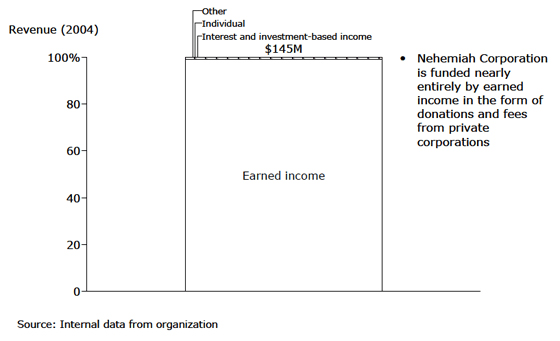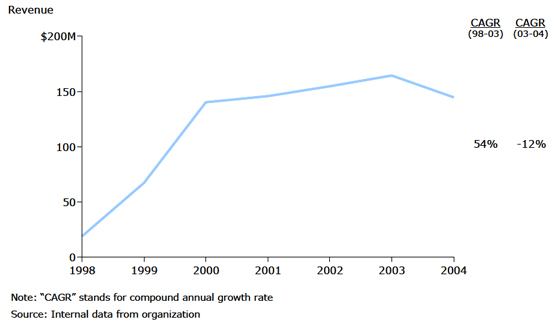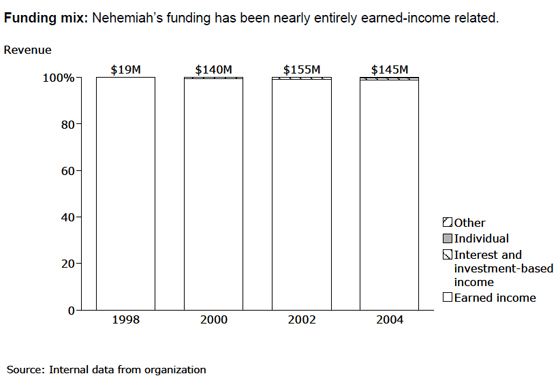In the beginning, our growth was due to being in the right place at the right time. Now it is due to our people, our management, and our operational practices.
– Scott Syphax, Chief Executive
Overview
Related Content
How Nonprofits Get Really BigOrganization Profiles from How Nonprofits Get Really Big
The Nehemiah Corporation of America was founded in 1997 when a regulatory change by the Department of Housing and Urban Development (HUD) made it legal for nonprofit organizations to disburse private-sector donations to low-income families for home purchases. Through its Nehemiah Program, the Nehemiah Corporation charges its private-sector donors a small fee in return for its grant placement services (namely ensuring the eligibility and ability to pay of its grantees). Much of the organization’s growth has resulted from adding new corporate partners or expanding relationships with existing partners.
The Corporation uses margins generated by the Nehemiah Program’s transactions to fund entrepreneurial activities related to the organization’s core mission of “transforming lives by increasing homeownership and asset development opportunities for diverse populations, while maintaining our commitment to successful, responsible homeownership.” These activities have resulted in the creation of a number of subsidiaries including: a community foundation; a seed capital grantmaking entity targeting community organizations; an equity fund focused on real estate investment in low-income areas in Sacramento, CA; and an urban volunteer program for church-going youth.
Founding date: 1997
Revenue (2004): $145 million
Structure: Single organization
NCCS classification: Housing & shelter—housing development, construction
Services: Provides Operates as a community development corporation specializing in homeownership, affordable housing, and community development
Beneficiaries: Low-income families
Leadership (selected): Scott Syphax, Chief Executive Officer
Address: 1851 Heritage Lane, Suite 201, Sacramento, CA 95815
Website: www.nehemiahcorp.org

Growth Story
- 1994 – A program run by a historically black Sacramento church inspires Don Harris to pursue a model of disbursing private-sector donations to low-income families for home purchases.
- 1994 - 1997 – Harris lobbies for changes to Department of Housing and Urban Development (HUD) regulations, securing special approval from the IRS. He runs successful pilot projects in California. These pilots combined with continued advocacy help spur HUD to enact nationwide regulatory change, making the Nehemiah model possible.
- 1997 – Harris creates the Nehemiah Corporation (a nonprofit organization) to manage the Nehemiah Program, which makes gifts to low-income families to assist in down-payments on homes.
- 2001 – Scott Syphax joins Nehemiah as its new chief executive officer. He leads a reorganization of Nehemiah’s staff and operations, replacing 40% of the staff. Many of the new hires are professionals with private sector experience.
- 2001 - 2005 – Syphax and Nehemiah’s leadership team launch a number of new ventures to widen the community development services in Nehemiah Corporation’s portfolio.
Revenue Trends
Revenue growth: Nehemiah grew rapidly from its founding through 2003. Its revenues began to fall off in 2003 as competition became more intense.

Funding mix: Nehemiah’s funding has been nearly entirely earned-income related.

Actions That Helped Propel Growth in Funding
- Translated regulatory changes into an opportunity for rapid growth. Nehemiah’s founder Don Harris worked for three years lobbying the Department of Housing and Urban Development (HUD) for regulatory changes that would make the Nehemiah model viable. After several demonstration projects, HUD approved Nehemiah’s model, opening a large new market for assisting lower-income homebuyers.
- Fueled growth with earned income. Nehemiah offers a service in the housing market that could be viewed as unseemly for a for-profit company to provide. The organization’s ability to charge a fee to private corporations for its services has funded its very rapid growth and allowed it to expand its services.
- Grew management capacity along with revenues. Nehemiah has maintained its appeal to donors by consistently providing world-class services. Its recruitment of top private sector talent and eagerness to adopt private sector practices has allowed the organization to stay at the forefront of its market, even as nonprofit competitors have emerged.
Funding Challenges
- Surviving success. Nehemiah’s leadership has found the organization’s earned income success to be a handicap in the philanthropic arena. Despite a strong desire to obtain foundation funding, they have not succeeded in doing so—an inability they attribute to funders believing the organization does not need their help to survive. Nehemiah’s success with earned income also has raised regulatory suspicions regarding the validity of its nonprofit status.
- Facing increased competition. The entrance of private-sector competitors into the market Nehemiah helped to create slowed the organizations’ growth and more recently has led to revenue declines.

